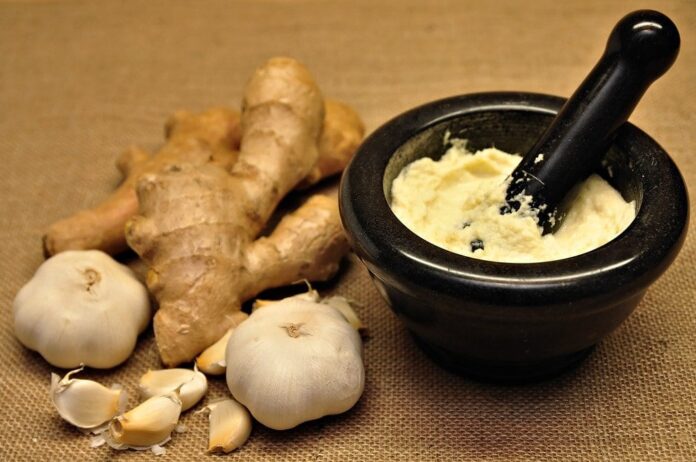1. Contains gingerol, which has potent medicinal properties
Ginger has a long history of use in various forms of traditional and alternative medicine. It’s been used to aid digestion, reduce nausea, and help fight the flu and common cold, to name a few of its purposes.
The unique fragrance and flavor of ginger come from its natural oils, the most important of which is gingerol.
Gingerol is the main bioactive compound in ginger. It’s responsible for many of ginger’s medicinal properties.
2. Can treat morning sickness and other forms of nausea
Ginger may be effectiveTrusted Source against nausea, including pregnancy-related nausea, commonly known as morning sickness.
Ginger may help relieve nausea and vomiting for people undergoing certain types of surgery, and it may also help reduce chemotherapy-related nausea.
While generally safe, it’s best to talk with a doctor before taking large amounts if you’re pregnant.
Ginger may not be suitableTrusted Source during pregnancy for people who are close to labor and those with a history of pregnancy loss or vaginal bleeding. It may also be unsuitable for those with clotting disorders
3. May help with weight loss
Ginger may play a role in weight loss, according to studies in humans and animals.
One 2019 reviewTrusted Source concluded that ginger supplementation significantly reduced body weight, the waist-hip ratio, and the hip ratio in people with overweight or obesity.
Ginger’s ability to influence weight loss may be due to certain mechanisms, such as its potential to reduce inflammation.
4. Can help with osteoarthritis
Osteoarthritis (OA) involves degeneration of the joints, leading to symptoms such as joint pain and stiffness.
One review concluded that ginger may help reduce pain and disability.The participants took 0.5–1 gram of ginger per day for 3–12 weeks, depending on the study. Most had a diagnosis of OA of the knee.
However, other researchTrusted Source has not found evidence of the same effects.
However, many discontinued treatment as they did not like the taste of ginger or because it upset their stomach.
5. May lower blood sugar and improve heart disease risk factors
Some research suggests ginger may have anti-diabetic properties.
In a 2015 studyTrusted Source, 41 people with type 2 diabetes took 2 grams of ginger powder per day.
A 2022 reviewTrusted Source found a significant reduction in fasting blood sugar and HbA1c in people with type 2 diabetes after taking ginger supplements.
The review looked at results from 10 trials, in which participants took 1,200–3,000 milligrams (mg) per day for 8–13 weeks.
The results did not suggest that ginger supplements affected the lipid profile.
After 12 weeks:
- their fasting blood sugar was 12% lower
- their hemoglobin A1c (HbA1c) levels were 10% lower
- their apolipoprotein B/ apolipoprotein A-I ratio was 28% lower
- their malondialdehyde (MDA) levels were 23% lower
A high apolipoprotein B/apolipoprotein A-I ratio and high levels of malondialdehyde (MDA) can result from oxidative stress, a byproduct of oxidative stress. They are both risk factors for heart disease.
However, this was one small study, and more research is needed to confirm these results.
A 2019 review also found evidence that ginger can reduce HbA1c in people with type 2 diabetes, but the authors did not conclude that it can lower fasting blood sugar levels.
Is ginger good for people with diabetes?
5. May lower blood sugar and improve heart disease risk factors
Some research suggests ginger may have anti-diabetic properties.
In a 2015 studyTrusted Source, 41 people with type 2 diabetes took 2 grams of ginger powder per day.
A 2022 reviewTrusted Source found a significant reduction in fasting blood sugar and HbA1c in people with type 2 diabetes after taking ginger supplements.
The review looked at results from 10 trials, in which participants took 1,200–3,000 milligrams (mg) per day for 8–13 weeks.
The results did not suggest that ginger supplements affected the lipid profile.
After 12 weeks:
- their fasting blood sugar was 12% lower
- their hemoglobin A1c (HbA1c) levels were 10% lower
- their apolipoprotein B/ apolipoprotein A-I ratio was 28% lower
- their malondialdehyde (MDA) levels were 23% lower
A high apolipoprotein B/apolipoprotein A-I ratio and high levels of malondialdehyde (MDA) can result from oxidative stress, a byproduct of oxidative stress. They are both risk factors for heart disease.
However, this was one small study, and more research is needed to confirm these results.
A 2019 review also found evidence that ginger can reduce HbA1c in people with type 2 diabetes, but the authors did not conclude that it can lower fasting blood sugar levels.
Is ginger good for people with diabetes?
Gingerol has powerful anti-inflammatory and antioxidant effects, according to researchTrusted Source. For instance, it may help reduce oxidative stress, which results from having too many free radicals in the body.
Gingerol, a natural component of ginger root, benefits gastrointestinal motility ― the rate at which food exits the stomach and continues along the digestive process.
Eating ginger encourages efficient digestion, so food doesn’t linger as long in the gut.” Nausea relief.



